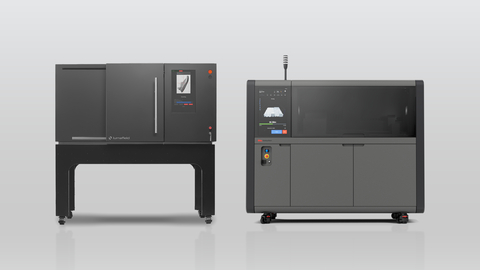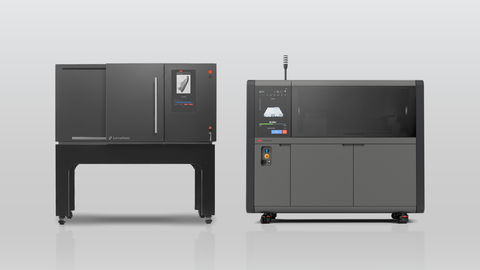BOSTON--(BUSINESS WIRE)--Desktop Metal, Inc. (NYSE: DM), a global leader in additive manufacturing technologies for mass production, and Lumafield, a startup offering the world’s first accessible industrial X-ray CT platform, today announced a complete solution to help manufacturers quickly and accurately produce high-demand parts with an easy system to scan and 3D print.
As a result of the COVID pandemic, manufacturers have been faced with historic supply chain disruptions, along with wide swings in pricing and inventory – a challenge highlighted by the Biden Administration’s recent announcement of the AM Forward initiative to strengthen U.S. supply chains by supporting adoption of additive manufacturing (AM), or industrial 3D printing.
Additive manufacturing offers the ability to cost-effectively in-source production and reduce supply chain risk, but often requires manufacturers to have CAD models of their parts. That has been a significant barrier; manufacturers often rely on thousands or millions of parts, many of which were designed years ago and don’t have associated CAD files. 3D scanning has been proposed as a solution, but it’s limited to capturing exterior part features.
The Supply Chain Resilience package from Desktop Metal and Lumafield closes that gap by joining 3D printing with X-ray computed tomography, also known as CT scanning. The combination of these technologies allows manufacturers to scan old parts and reproduce them quickly in a variety of materials using 3D printing.
Lumafield’s CT platform digitizes parts with a series of X-ray images that capture both external and internal features in detail, using powerful cloud-based software to create a 3D model that can be exported as a mesh representation for 3D printing.
Desktop Metal’s software and 3D printers can then turn those mesh models back into high-quality metal or polymer parts, making it possible to seamlessly replace legacy manufacturing processes with in-house 3D printing.
“Manufacturers have wanted to replace legacy fabrication processes with 3D printing for a long time, but digitalization of parts has been a barrier,” said Ric Fulop, Founder and CEO of Desktop Metal. “With accessible CT scanning, we finally have the digitization solution we need to quickly convert old designs into complete CAD files for 3D printing.”
“The last two years have been profoundly disruptive, and we cannot expect our supply chains to return to normal,” said Eduardo Torrealba, Co-Founder and CEO of Lumafield. “Fortunately, we now have the technology to seamlessly bring production in-house, taking control of our supply chains and reducing risk.”
Supply Chain Resilience Package Details
Customers interested in pairing a Lumafield scanner with a Desktop Metal printer can customize the solution that best fits their needs.
Desktop Metal printers initially included in this offering include:
- All metal printers, including the Desktop Metal Shop System™, which was built as a turnkey solution for smaller enterprises and is offered in a 4-, 8-, 12- or 16-liter package. Also included: the Studio System™, X-Series and all Production System™ models, which includes the P-1 and P-50 – the latter of which is the world’s fastest system to 3D print metal parts at scale.
- All ETEC DLP polymer 3D printing systems, which includes the D4K, P4K, Envision One XL or Xtreme 8K, which offer a wide range of price points, build volumes and potential polymer material sets, including elastomers, hard plastics, high temperature plastics, and biocompatible materials.
Lumafield’s Neptune scanner is a revolutionary advance over legacy CT systems. It’s at home in any office or workshop environment, ready to become an everyday tool for entire engineering teams. With a user-friendly touchscreen and AI-powered configuration, anyone can use it with minimal training—no dedicated operator required.
Lumafield’s cloud-based Voyager software turns scans into actionable insights and is included with every Neptune scanner. In addition to producing mesh exports for 3D printing, it offers intuitive visualizations that reveal invisible features, measurement tools that take guesswork out of inspection, and a powerful automated analysis engine that pinpoints voids, pores, and cracks before they turn into critical problems. Voyager runs in the cloud, accessible through any desktop web browser, so teams can collaborate and share data in real time.
The Supply Chain Resilience package is available to any company that purchases a Desktop Metal 3D printer and reserves a Lumafield CT scanner between May 1 and July 1, 2022. Customers will be entitled to a package benefit of 15 CT scans and application engineering support through Lumafield’s scanning service while they wait for delivery of their Neptune scanner, currently expected to take place in the fourth quarter of 2022.
For more information, visit:
https://learn.desktopmetal.com/supplychain_lumafield_package
https://promotions.lumafield.com/supply-chain-resilience-package
About Desktop Metal
Desktop Metal, Inc., based in Burlington, Massachusetts, is accelerating the transformation of manufacturing with an expansive portfolio of 3D printing solutions, from rapid prototyping to mass production. Founded in 2015 by leaders in advanced manufacturing, metallurgy, and robotics, the company is addressing the unmet challenges of speed, cost, and quality to make additive manufacturing an essential tool for engineers and manufacturers around the world. Desktop Metal was selected as one of the world’s 30 most promising Technology Pioneers by the World Economic Forum, named to MIT Technology Review’s list of 50 Smartest Companies, and the 2021 winner of Fast Company’s Innovation by Design Award in materials and Fast Company’s Next Big Things in Tech Award for sustainability.
About Lumafield
Lumafield, based in Cambridge, Massachusetts, offers the world’s first accessible industrial X-ray CT platform, giving engineers the ability to see their work clearly, inside and out, for less than $3,000 per month. By offering unprecedented visibility into products, as well as AI-driven tools that highlight problems and generate quantitative data, Lumafield promises to revolutionize the way complex products are created, manufactured, and used across industries.
Forward-looking Statements
This press release contains certain forward-looking statements within the meaning of the federal securities laws. Forward-looking statements generally are identified by the words “believe,” “project,” “expect,” “anticipate,” “estimate,” “intend,” “strategy,” “future,” “opportunity,” “plan,” “may,” “should,” “will,” “would,” “will be,” “will continue,” “will likely result,” and similar expressions. Forward-looking statements are predictions, projections and other statements about future events that are based on current expectations and assumptions and, as a result, are subject to risks and uncertainties. Many factors could cause actual future events to differ materially from the forward-looking statements in this document, including but not limited to, the risks and uncertainties set forth in Desktop Metal, Inc.'s filings with the U.S. Securities and Exchange Commission. These filings identify and address other important risks and uncertainties that could cause actual events and results to differ materially from those contained in the forward-looking statements. Forward-looking statements speak only as of the date they are made. Readers are cautioned not to put undue reliance on forward-looking statements, and Desktop Metal, Inc. assumes no obligation and does not intend to update or revise these forward-looking statements, whether as a result of new information, future events, or otherwise.






